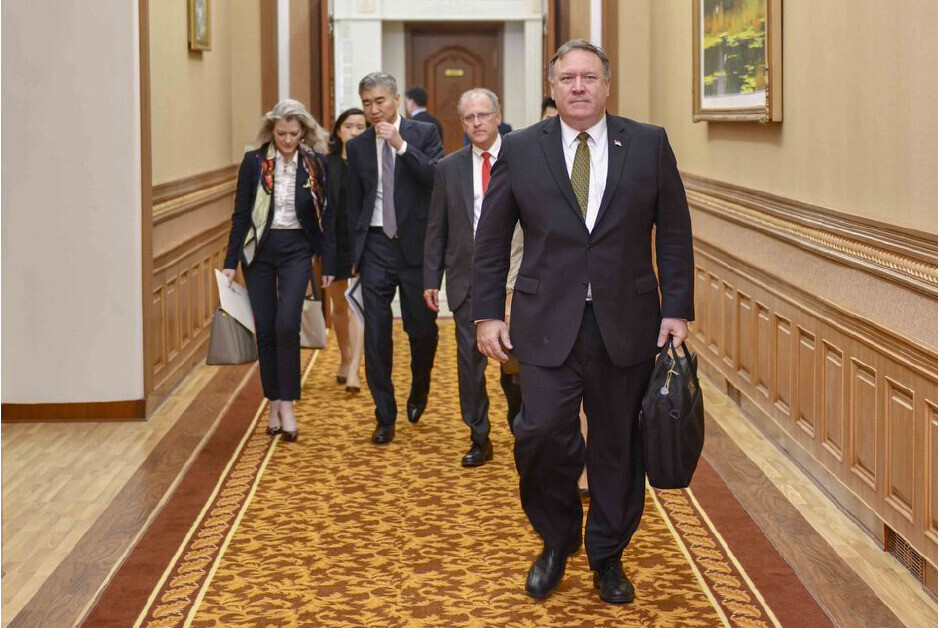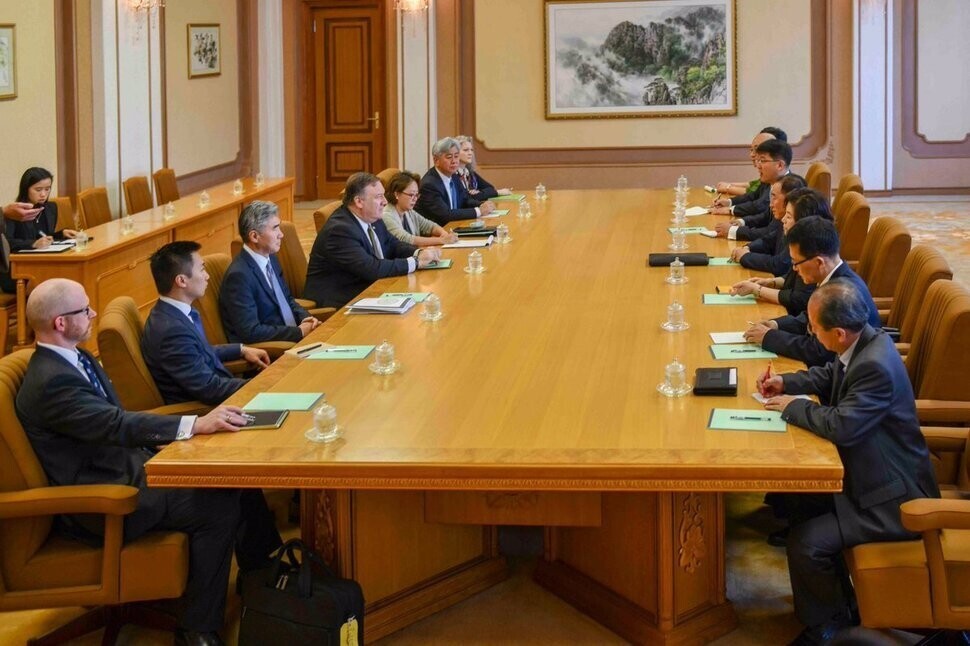[News analysis] Why did Biden call for Sung Kim’s return?
The former US ambassador to the Philippines played a key role during the Trump administration’s talks with N. Korea

Secretary of State Mike Pompeo heads to a meeting with high-level North Korean officials in Pyongyang on July 7, 2018. Behind him is Sung Kim (second right), then US ambassador to the Philippines. (Hankyoreh archives)
Sung Kim, an expert on the North Korean nuclear issue and the US ambassador to Indonesia, was named acting assistant secretary of state for East Asian and Pacific affairs on Jan. 20, the day of US President Joe Biden’s inauguration.
Since Kim was closely involved in the North Korean nuclear talks that were so energetically pursued by the Trump administration, his appointment is likely to speed up the Biden administration’s promised review of US policy on the North Korean nuclear program.
Key officials and nominees in the Biden administration have declined to comment specifically on how they’ll handle the North Korean nuclear issue, one of the most intractable US foreign policy challenges, and have only promised a review of past policies.
Antony Blinken, Biden’s nominee for Secretary of State, said during a confirmation hearing at the US Senate on Jan. 19 that the US would review all options with its allies, including South Korea and Japan.
During a press briefing on Jan. 22, White House Press Secretary Jen Psaki said, “We will adopt a new strategy to keep the American people and our allies safe. That approach will begin with a thorough policy review [. . .] in close consultation with South Korea, Japan, and other allies,” Psaki said.
The main questions are how long this review will take, and which direction it will go.
In that sense, Sung Kim’s appointment can be regarded as having significant implications for the Biden administration’s actions on North Korea. Kim is an expert on the North Korean issue who served as the US’ special envoy to the Six-Party Talks and the North Korean nuclear issue during the Obama administration.

Pompeo and Kim meet with their North Korean counterparts in Pyongyang on July 7, 2018.
Kim’s role during negotiations with Pyongyang
Kim was also in the thick of North Korean nuclear negotiations during the Trump administration. That sets him apart from Biden appointees who have been out of public office for some time, including Blinken; Wendy Sherman, the nominee for deputy secretary of state; and Kurt Campbell, who will be the Indo-Pacific coordinator for the White House National Security Council.
Most significantly, Kim sat down across from Choe Son-hui, North Korea’s implacable First Vice Minister of Foreign Affairs, during the working-level talks at Panmunjom in late May 2018 at which the agenda was set for the first North Korea-US summit, held in Singapore on June 12. Kim was also in Singapore to watch the historic summit in person.
Subsequently, Sung Kim accompanied US Secretary of State Mike Pompeo on his third trip to Pyongyang on July 6-7 for a high-level meeting with Kim Yong-chol, then vice chairman of the Workers’ Party of North Korea (WPK) and director of the WPK United Front Department.
The North’s reported dislike of Pompeo
When Pompeo asked the North Koreans to provide a list of their nuclear facilities as a first step toward denuclearization, Kim Yong-chol reportedly flung his phone at Pompeo. “Call Trump. He wouldn’t talk to us like that,” Kim reportedly shouted at the US’ top diplomat.
Immediately following Pompeo’s departure from Pyongyang, the spokesperson for North Korea’s Foreign Ministry was quoted by the North’s state-run Korean Central News Agency as saying that Pompeo had only brought a “gangster-like demand for denuclearization.”
Sung Kim was removed from the working-level negotiations with North Korea following Stephen Biegun’s appointment that August as the US’ Special Representative for North Korea. But Kim was involved in the working-level negotiations for North Korea and the US’ joint statement at Singapore, which South Korean President Moon Jae-in has said should be the starting point for North Korea-US dialogue.
That means Kim probably has as deep an understanding of that statement’s significance — and limitations — as South Korean officials such as Suh Hoon, director of the Blue House National Security Office, and Chung Eui-yong, the nominee for foreign minister.
In short, Sung Kim’s appointment could be taken to mean that the Biden administration believes the North Korean nuclear issue requires an urgent solution and will accelerate its review of related policy. And since Kim, who is of Korean descent, is fluent in Korean, he can also communicate more easily with his South Korean counterparts.
However, the fact that Kim has been named “acting” assistant secretary of state means it’s too soon to tell whether he’ll stick around to carry out actual policy as Biden’s official assistant secretary of state for East Asian and Pacific affairs.
How much will Biden cooperate with Moon on N. Korea policy?
The critical question is the extent to which the Biden administration’s North Korea policy will synchronize with that of the Moon administration. Whereas Moon seeks to get tangible results in the final year of his presidency by boldly reactivating the Korean Peninsula peace process, the Biden administration is likely to take an extremely prudent approach in order to avoid repeating the string of mistakes made by the Biden and Trump administrations.
Since Sung Kim, in his capacity as an American diplomat, personally experienced North Korea’s bizarre approach to the denuclearization of the Korean Peninsula on his visit to Pyongyang after the Singapore summit, his ideas are almost certainly different from those of South Korean officials.
Sometimes, the person one expects to be a reliable helper turns out to be a serious obstacle.
By Gil Yun-hyung, staff reporter
Please direct comments or questions to [english@hani.co.kr]